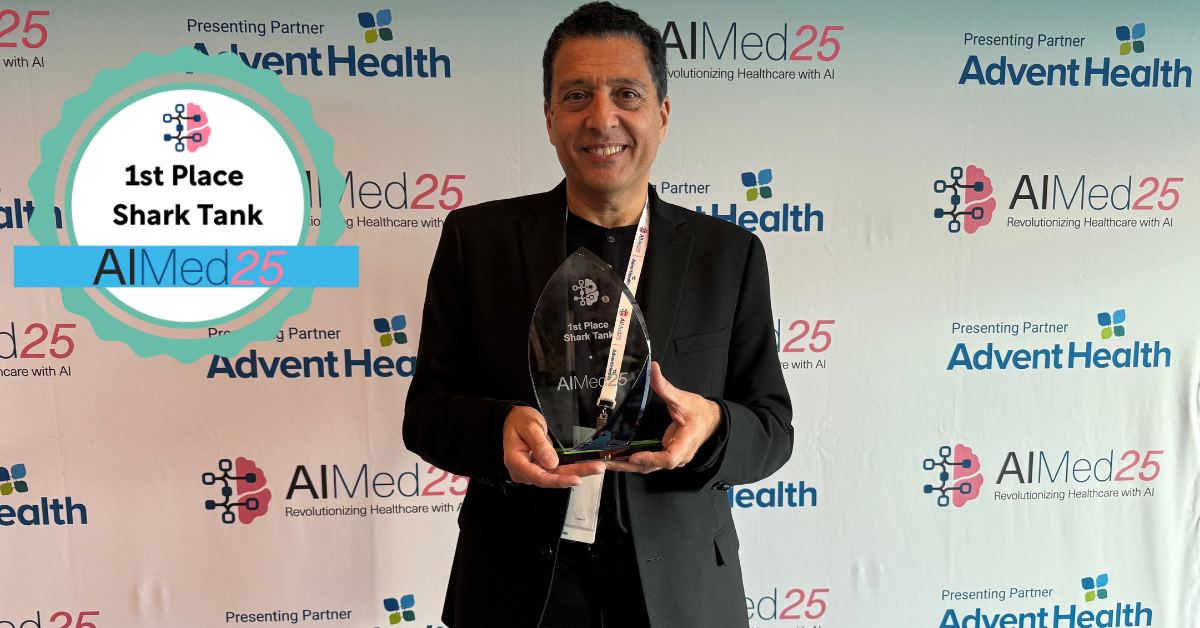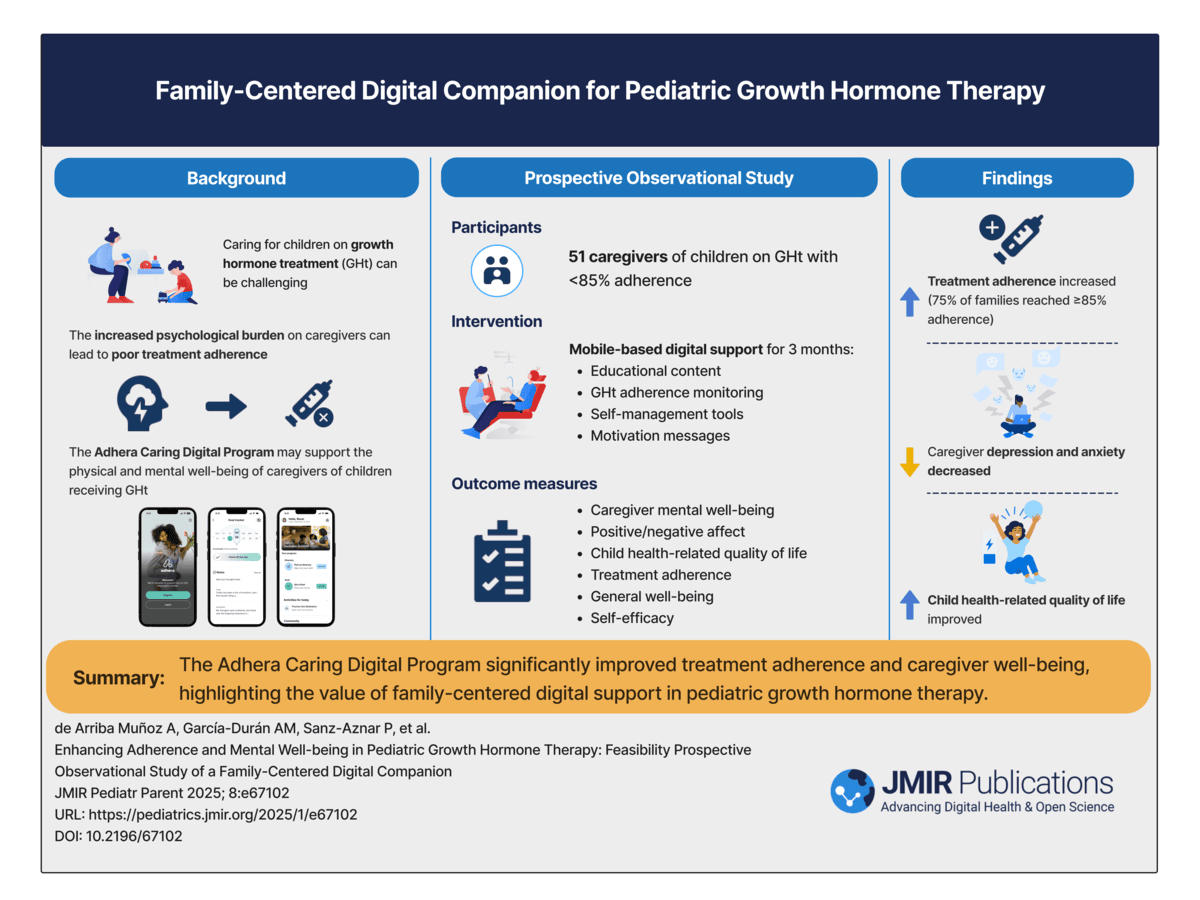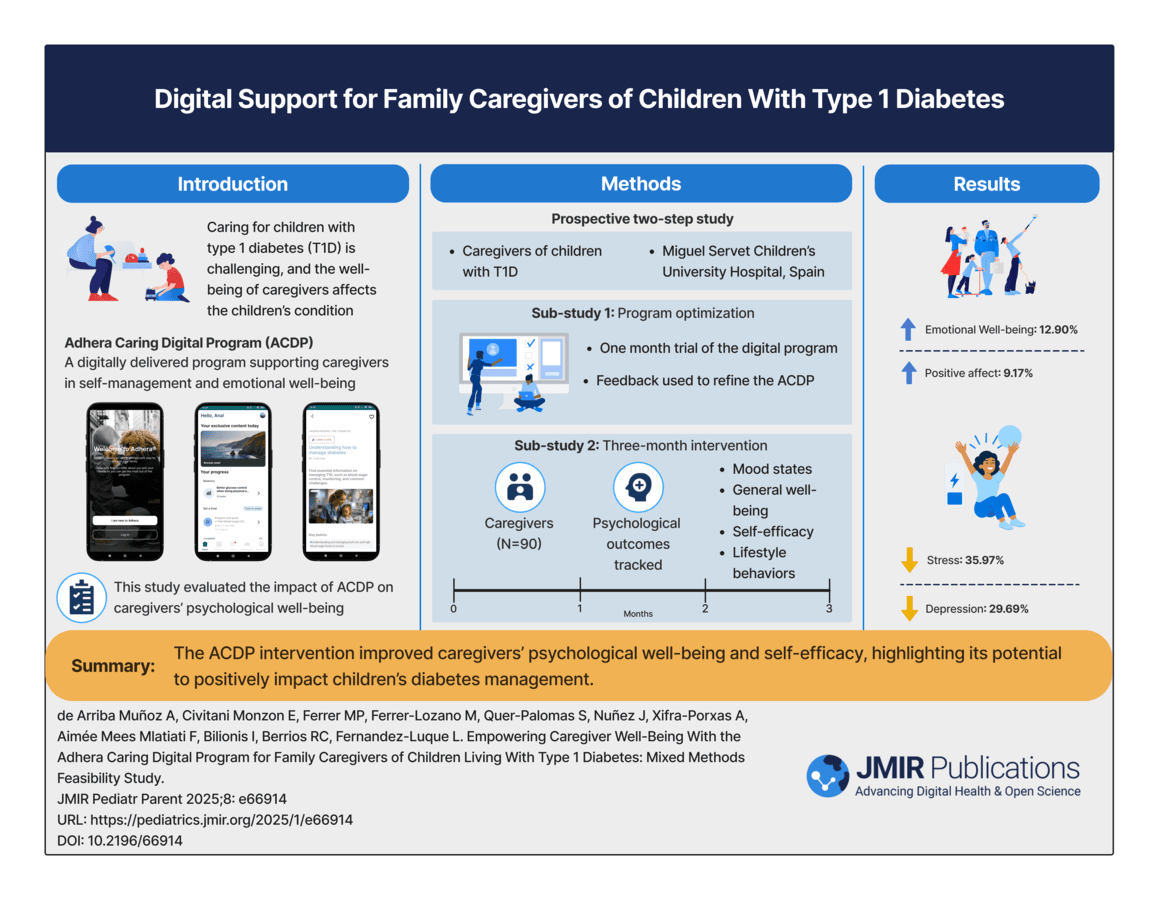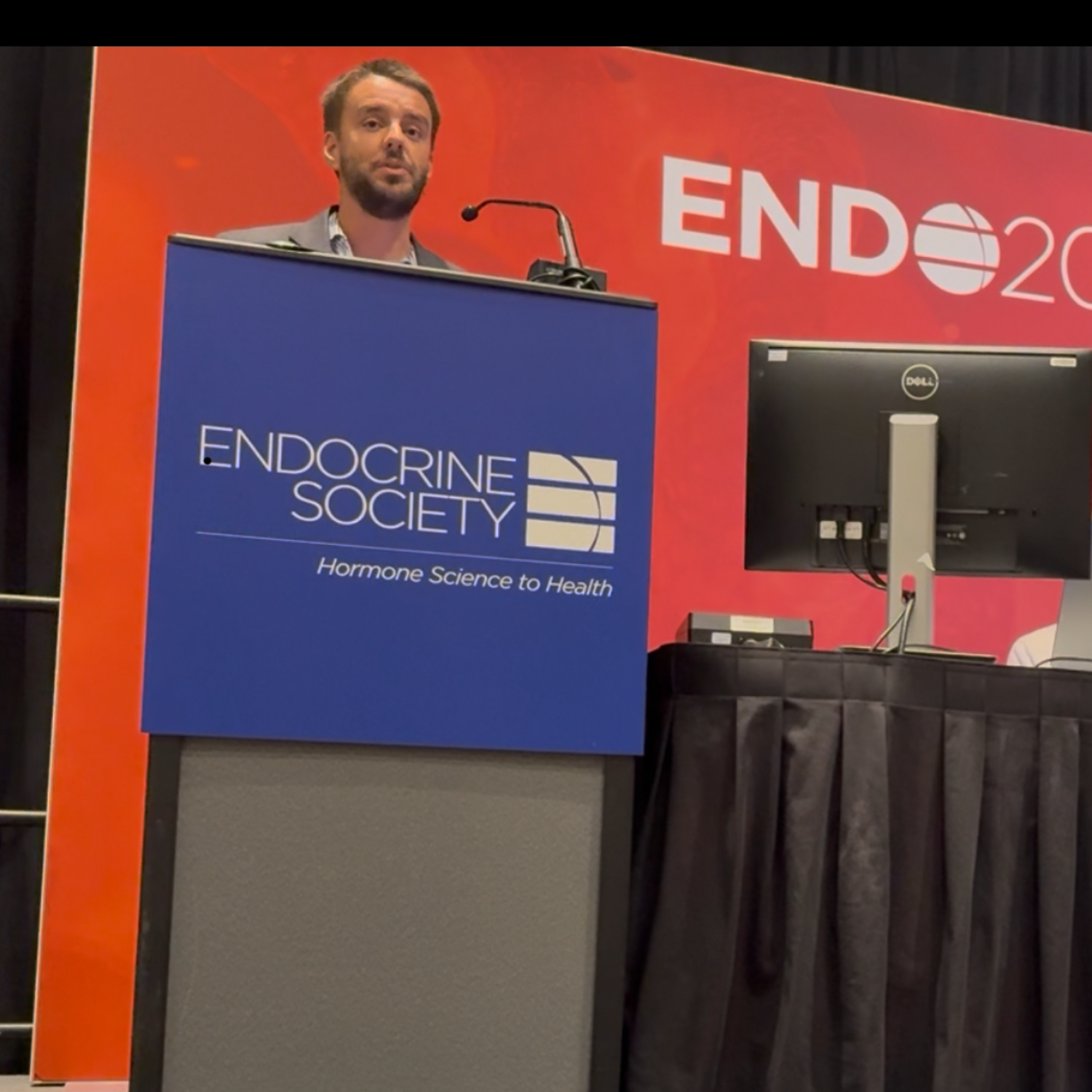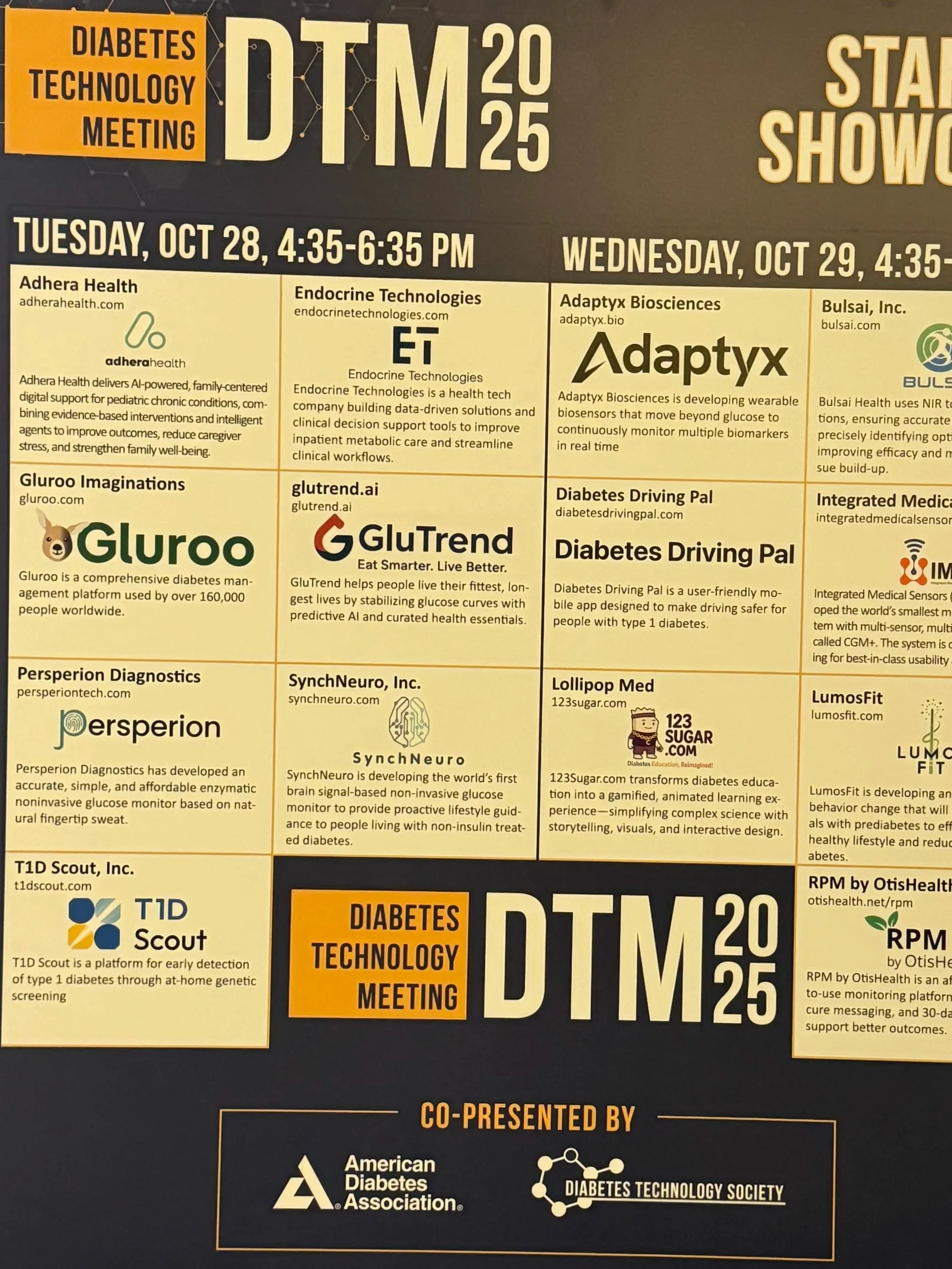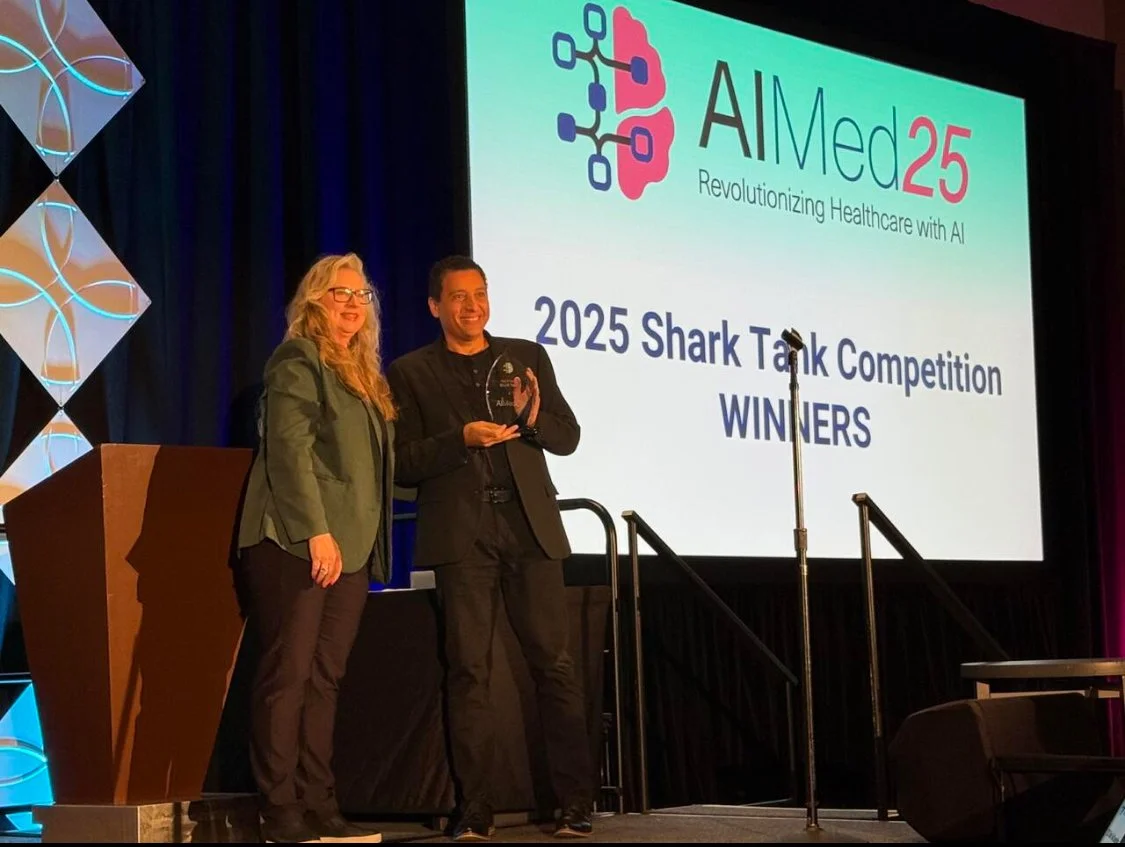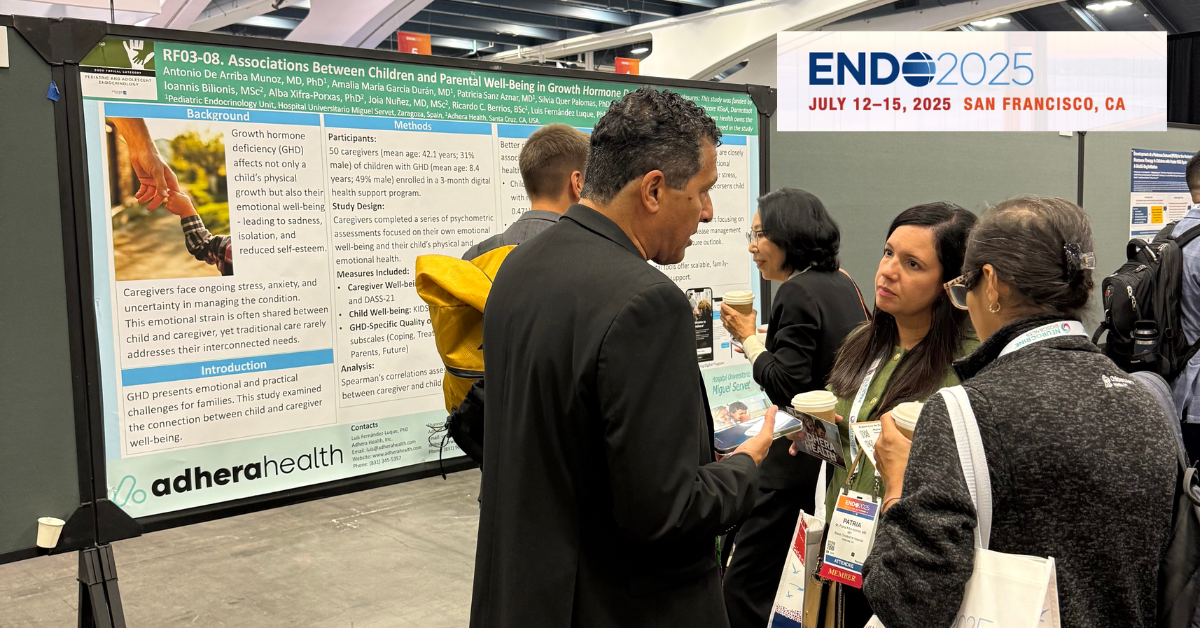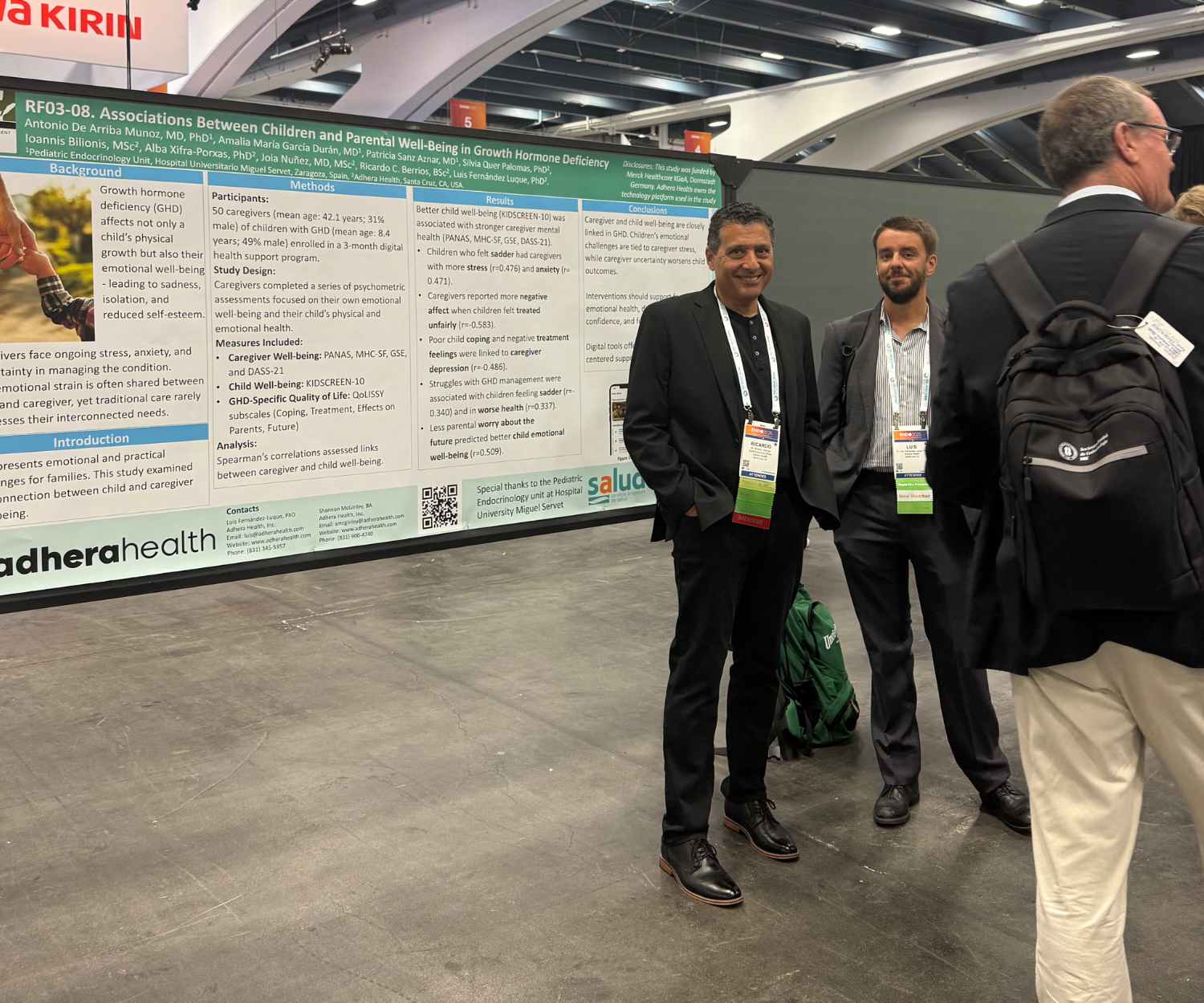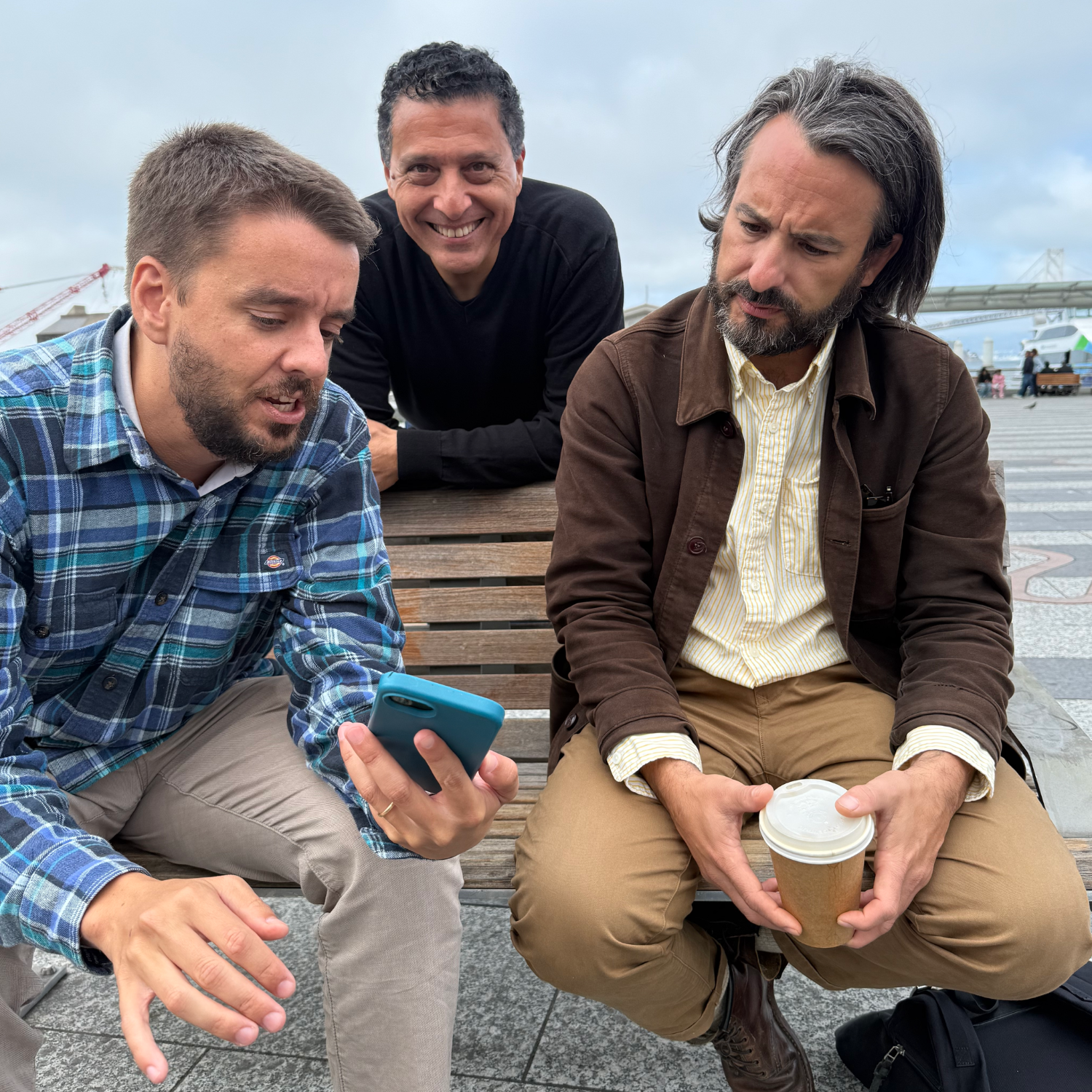Four Months of Momentum: Adhera Health’s Breakthroughs in Empathic AI, Clinical Evidence, and Industry Recognition
From ENDO 2025 to DTM to AIMed25, Adhera Health has been on a remarkable trajectory. Our research was featured by the Endocrine Society, our AI Health Agentic Platform drew strong interest from diabetes innovators, and our empathic AI approach won First Place at AIMed25’s Shark Tank competition. This momentum signals a shift: family-centered, emotionally intelligent AI is emerging as the future of pediatric chronic care.
The past several months has been a remarkable period of growth, validation, and recognition for Adhera Health. From publishing three peer-reviewed studies to presenting at ENDO 2025, participating in the Diabetes Technology Meeting’s Startup Showcase, and winning the AIMed25 Shark Tank competition - one theme has been consistent: Empathic AI is resonating across the entire healthcare ecosystem.
This momentum represents years of work building emotionally intelligent, family-centered technologies that support families, clinicians, and care teams in pediatric chronic care.
Three New Peer-Reviewed Studies in JMIR Pediatrics & Parenting
This year, we published three studies in JMIR Pediatrics & Parenting validating the impact of our digital programs across pediatric chronic conditions.
1. Enhancing Adherence and Mental Well-being in Pediatric Growth Hormone Therapy
This study demonstrated improvements in adherence, emotional well-being, and confidence among families using a family-centered digital companion during pediatric GHD therapy.
JMIR Pediatrics & Parenting Published on 27.Oct.2025
This is a visual abstract summarizing the key findings of the research titled "Enhancing Adherence and Mental Well-Being in Pediatric Growth Hormone Therapy: Feasibility Prospective Observational Study of a Family-Centered Digital Companion," published in JMIR Pediatrics and Parenting in 2025. The study found that the Adhera Caring Digital Program significantly improves treatment adherence and enhances caregivers’ quality of life.
2. Empowering Caregiver Well-Being for Families Managing Type 1 Diabetes
This publication showed meaningful reductions in caregiver depression and anxiety, along with improved confidence and treatment adherence.
JMIR Pediatrics & Parenting Published on 05.Feb.2025
This is a visual abstract summarizing the key findings of the research titled "Empowering Caregiver Well-Being With the Adhera Caring Digital Program for Family Caregivers of Children Living With Type 1 Diabetes: Mixed Methods Feasibility Study," published in JMIR Pediatrics and Parenting in 2025. The study found that the Adhera Caring Digital Program improved caregivers’ psychological well-being and self-efficacy, suggesting that digital solutions can support caregiver mental health and enhance diabetes management.
3. Digital Health Support for Caregivers of Children Undergoing Growth Hormone Therapy
This qualitative analysis revealed emotional and behavioral benefits for caregivers supporting children through growth hormone therapy.
JMIR Pediatrics & Parenting Published on 05.Feb.2025
This is a visual Abstract of the paper titled: Digital Health Program to Support Family Caregivers of Children Undergoing Growth Hormone Therapy: a Qualitative Feasibility Study.
Scientific Leadership at ENDO 2025
Our Growth Hormone Disorder study, conducted with the Pediatric Endocrinology Department at Hospital Miguel Servet and supported by Merck, was selected both as a poster and for the highly competitive Rapid Fire format. Presented by Luis Fernández Luque, PhD, Adhera Health’s Chief Scientific Officer, the research was also chosen as one of just 24 abstracts (out of more than 2,700) featured in the Endocrine Society’s official press releases. The study emphasized the strong relationship between caregiver mental health and a child’s coping, adherence, and clinical trajectory - reinforcing the need for holistic, family-centered interventions that account for the shared emotional experience of GHD.
Our T1D presentation, supported by Novo Nordisk, explored how severe hypo- and hyperglycemic events - especially at night - impact not only children’s well-being but also caregiver stress and children’s academic performance.
And through our NIH-funded partnership with Children’s Hospital Los Angeles, we brought forward the lived experiences of Latino families managing childhood obesity, revealing cultural, emotional, and structural challenges that point to an urgent need for more culturally competent, emotionally supportive tools.
Together, these studies reflect Adhera Health’s growing scientific momentum and reinforce our commitment to advancing emotionally intelligent, family-centered digital support across pediatric chronic conditions.
Startup Showcase at the 2025 Diabetes Technology Meeting
On October 28, Adhera Health was featured in the Startup Showcase at the Diabetes Technology Meeting (DTM), hosted by the Diabetes Technology Society and co-sponsored by the American Diabetes Association. Being selected for this stage allowed us to share our growing body of scientific evidence and highlight the real-world needs of families managing complex pediatric chronic conditions.
At DTM, we presented our evolution from the Adhera Caring Digital Program (ACDP) to our AI Health Agentic Platform, illustrating how emotionally intelligent, family-centered AI can extend clinical care into the home. We demonstrated how our agents support families navigating Type 1 Diabetes and obesity/pre-diabetes, addressing not only treatment adherence but also the behavioral, emotional, and cultural factors that shape a child's health journey. This milestone further reinforced our momentum as we continue to advance next-generation digital tools that meet families where they are.
AIMed25 Shark Tank Winner
And just last week, Adhera Health achieved one of our most exciting milestones yet - winning First Place at the AIMed25 Shark Tank competition in San Diego, California. Competing among some of the most innovative AI-driven healthcare companies, our vision for family-centered pediatric chronic care stood out clearly to the judges.
They highlighted the strength of our approach, including:
Emotionally intelligent AI Health Agents that extend compassionate support into the home
Small Language Models (SLMs) trained on real whole-family data
Clinically validated impact, backed by peer-reviewed studies and real-world evidence
A family-centered design philosophy that supports children, caregivers, clinicians, and care teams
This recognition underscores what we believe deeply: Empathic AI isn’t just a technological advance - it’s the foundation of modern pediatric chronic care.
A Unified Digital Ecosystem
Adhera Health connects families, clinicians, care teams, payors, and employers in a unified digital ecosystem that bridges clinical care and real-world family life.
Our AI Health Agents enable:
Family-centered pediatric chronic care management
Emotionally intelligent support in the home
Improved adherence, engagement, and caregiver well-being
Actionable insights for health systems and employers
Better coordination across the care continuum
By linking clinical outcomes to the day-to-day lives of families, our platform reduces both the human and financial burden of pediatric chronic conditions.
Conclusion
This season of recognition - three JMIR studies, ENDO presentations, DTM Showcase participation, and the AIMed25 win - marks a defining moment for Adhera Health.
We set out to build technology rooted in empathy and science. Today, with growing validation across research, clinical communities, and innovation platforms, that vision is taking shape in powerful ways.
Empathic AI isn’t the future - it’s what families need right now.
Standing With California Families: What I’ve Learned From Parents Navigating Type 1 Diabetes
Managing a child’s type 1 diabetes brings more than medical challenges — it brings emotional, social, and financial strain for families across California. Through Adhera Health’s T1D beta program, I’ve heard directly from parents about their struggles and their hopes. One mother told me, “Letting out my voice gives me relief.” Another shared, “I felt love from people I didn’t even know.” These voices remind us why our AI + human digital companion must combine empathy, education, and community to truly support families.
In California, thousands of families live with the daily realities of pediatric type 1 diabetes (T1D). Nationally, more than 300,000 children and adolescents under 20 have T1D, with nearly 20,000 new cases diagnosed each year (source). For parents, the diagnosis brings not just medical complexity but also emotional and social challenges - from sleepless nights to stigma at school.
At Adhera Health, we are AI-native, building companions that combine intelligent digital agents with human coaching and community support. Our flagship, the Adhera Caring Digital Program (ACDP), delivers evidence-based, personalized support for families managing pediatric chronic conditions.
Recently, we launched our T1D beta program, and I had the privilege of interviewing parents participating in it. Their voices continue to guide how we design meaningful support.
What I’ve learned from these conversations:
Emotional support matters deeply. Parents often described overwhelm, grief, and fear after diagnosis. One mother told me, “Letting out my voice gives me relief.” Another said, “This came at the right time after a very dark moment.”
Education is power. Families praised step-by-step guidance on CGM use, carb counting, and school communication. Bite-sized lessons were described as “clear and easy” and “more than I expected.”
Community brings comfort. When caregivers connected with peers, the impact was profound. “I felt love from people I didn’t even know,” one parent shared. That sense of belonging is something no algorithm alone can provide - it’s the human layer that makes AI support real.
Families want child-inclusive tools. Parents of older children voiced a desire for features that help kids take more responsibility, building both confidence and independence.
These reflections align with what our peer-reviewed research in JMIR Pediatrics & Parenting has shown: family-centered digital interventions can reduce caregiver stress and improve adherence in pediatric chronic care:
Our beta shows that impact is not just theoretical - it’s happening in real homes, with real families.
As we deepen partnerships with California payors, children’s hospitals, and advocacy groups, our goal remains clear: support families with tools that combine the best of AI and human care, improve outcomes for children, and lower long-term healthcare costs.
I’m also excited to share that we are preparing to launch our beta program for families managing pediatric obesity, further expanding how we support families across conditions. And later this month, I’ll be attending the California Association of Health Plans Annual Conference in Desert Springs, CA, meeting with executives from California health plans, Medi-Cal, and others to discuss the results we’ve been seeing with families - and what’s next.
Adhera Health at ENDO 2025: Championing Family-Centered Innovation in Pediatric Chronic Care
At ENDO 2025, Adhera Health presented three groundbreaking studies on pediatric chronic conditions—highlighting how AI-powered digital companions can improve both child and caregiver outcomes in families managing growth hormone disorders, type 1 diabetes, and obesity. Here’s what we shared, who we partnered with, and why it matters.
Last week at ENDO 2025 in San Francisco, Adhera Health took the stage with three research presentations focused on family-centered approaches to pediatric chronic condition care. The team presented posters on Growth Hormone Deficiency (GHD), Type 1 Diabetes (T1D), and Pediatric Obesity - and delivered a Rapid Fire presentation during the Pediatric Growth Hormone session on Day 1.
Mental & Emotional Health in Growth Hormone Disorders
Ricardo C. Berrios, Adhera Health’s CEO and Luis Fernandez Luque, PhD, Adhera Health’s Chief Scientific Officer, presenting at ENDO 2025
Our study on GHD, presented in both poster and rapid fire formats, emphasized the interconnected emotional and physical challenges experienced by children and their caregivers. It highlighted how caregiver mental health is strongly associated with a child’s coping and treatment outcomes. These findings reinforce the need for holistic, family-centered interventions that address the full lived experience of GHD - not just the medical aspects. This study was conducted in partnership with the University of Miguel Servet’s Pediatric Endocrinology Department (led by Dr. Antonio de Arriba) and supported by Merck GmbH.
From over 2,700 abstracts presented at ENDO 2025, only 24 were selected for official Endocrine Society press releases - and our study was one of them. You can read the release here.
Our findings didn’t just make waves at ENDO — they also sparked coverage in leading science and health media outlets like News-Medical and Medical Xpress, helping to bring the conversation around family-centered pediatric care to a broader global audience.
Luis Fernandez Luque, PhD, Adhera Health’s Chief Scientific Officer, presenting at ENDO 2025
Type 1 Diabetes and Severe Glycemic Events
Our second presentation, titled "Associations Between Severe Events of Hypo- and Hyperglycemia and Family Well-being", explored how fluctuations in blood sugar levels - particularly at night - affect not just children with T1D, but also their caregivers’ emotional state and children’s academic performance. Caregiver education emerged as a key protective factor, reinforcing the value of empowering families with knowledge and emotional guidance. This study was conducted in partnership with the University of Miguel Servet’s Pediatric Endocrinology Department (led by Dr. Antonio de Arriba) and supported by Novo Nordisk.
Obesity in Underserved Families
Our third poster focused on the lived experiences of Latino families managing childhood obesity. Through 11 participatory workshops involving over 50 families, the study uncovered key challenges: stigma, cultural food practices, limited access to resources, and mental health gaps. Caregivers stressed the need for culturally competent, emotionally supportive tools - pointing to digital companions as a promising solution to close the care gap. This work was supported by an SBIR grant from the NIH in partnership with Jennifer Raymond, MD, MCR an Associate Professor in Pediatric Endocrinology at Children's Hospital Los Angeles and her research team.
Shannon McGinley, Adhera Health’s Director of Marketing and one of the researchers on the NIH-funded study
Collaborator Connections at ENDO
Beyond the research presentations, ENDO 2025 was an opportunity to deepen our partnerships. We met with critical Key Opinion Leaders including Dr. Brad Miller (Professor of Pediatrics, University of Minnesota) and Dr. William Martinez ((Associate Professor of Clinical Psychiatry and Behavioral Sciences, University of California, San Francisco) to discuss future directions for research in growth disorders and mental health in pediatric obesity. We also connected with Dr. Tina Hu, Clinical Director of Diabetes Transition of Care at UCSF, to explore the evolving needs of adolescents with diabetes as they age into adult care.
Ricardo C. Berrios, Luis Fernandez Luque and Dr. William Martinez, Associate Professor of Clinical Psychiatry, UCSF, discussing future partnerships
Looking Ahead
We’re proud to be advancing the science behind family-centered care in pediatrics. Whether it’s Growth Hormone Deficiency, Type 1 Diabetes, or Obesity, our work highlights the power of pairing digital innovation with human understanding - and bringing the whole family into the center of chronic care management.
View the Posters:


